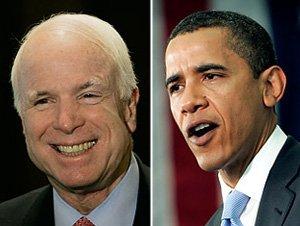Google searches paint a picture of how racism still infects America, hurt Obama
In barely a decade and a half, Google has become an extension of our brains: with mobile devices and computers we can have the answer to a question before we complete a sentence.
Google searches are something of a collective memory, but they also may constitute an MRI of our collective personality — diagnosing, especially, some of it’s more disturbing aspects.
Seth Stephens-Davidowitz, doctoral candidate in economics at Harvard, has conducted researching on voting patterns and racial prejudice as revealed by Google searches. His goal was to find out how much racial animosity hurt Barack Obama’s election results in 2008.
“I did that by measuring how much racial animus there is in different areas, based on their Google searches,” Stephens-Davidowitz said.
In essence, he was looking for people searching for bad things about African-Americans.
“Usually jokes with some very strong language,” he said.
He looked particularly at the “n-word” — searches containing the “n-word” — filtered geographically.
“I don’t think anything was totally shocking,” he said. “The number-one state in the country in the frequency of the search was West Virginia. See it a lot in the South as well, but I think it wasn’t just a southern phenomenon at all. A lot of searches in the Northeast, Midwest, Ohio, Pennsylvania, etc.”
From there, he was able to convert the volume of those searches into maps that showed how racial feelings vary across the country. He based it on the percent of racist searches as part of the larger total of Google searches, to account for differences in population from state to state.
What he found was startling. In areas where racially motivated searches were most common in the years before Obama became a candidate, Obama almost always performed worse that John Kerry did in 2004, or at least worse when compared with gains by other Democrats in those areas.
Specifically, he points to Obama’s performance in Denver, Colo., and Wheeling, W.Va. In both states, Stephens-Davidowitz wrote in The New York Times, Kerry received about 50 percent of the vote in 2004. But Wheeling had the seventh highest racially charged search rate in the country, while Denver was the fourth lowest.
Statistically, Obama should have won about 57 percent of the vote in both cities, based on the performance of other Democrats. That’s exactly what he got in Denver. In Wheeling, his support actually fell to 48 percent — lower than Kerry even.
“In other words, racial prejudice gave John McCain the equivalent of a home-state advantage nationally,” Stephens-Davidowitz wrote.
The same approach could be applied to feelings toward gays or lesbians — virtually any minority group.
“It’s a very interesting view into the human psyche we don’t normally have,” he said.
He also cautioned against drawing overly boad conclusions from his research. It’s not to say that everyone who is racist conducts these sorts of searches, nor that all who search using these words are motivated by racism.
“You aggregate what turns out to be millions and millions of searches and you get a great picture,” Stephens-Davidowitz said.
